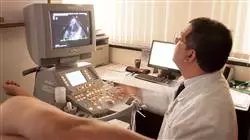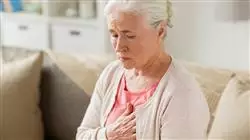University certificate
The world's largest faculty of medicine”
Description
This training will generate a sense of confidence in the performance of medical practice, which will help you grow both personally and professionally"

Cancer patients often present pathologies associated with the oncological process that require care. On the other hand, approaches to cancer patients are often aggressive and can affect other systems, which in the case of frail patients is a major problem in managing risk in therapeutic choices.
The heart is undoubtedly one of the organs most affected by systemic cancer treatments, and considering the importance of its functioning, it becomes an area of study that requires rigor, depth and timeliness.
Cardiological effects are routinely present in the side effects of most treatments for the oncology patient. The management of the medication, as well as of other therapeutic options, is fundamental in the adjustment of the appropriate dosage for medical praxis. Being up to date on the details of cardiac risk management in this type of patient is a fundamental skill for the physician to possess when dealing with the patient and his or her symptoms.
This program is designed to facilitate the specialist's updating process, so that he/she can include in the clinical practice of their patients all the innovations and the latest knowledge about oncological therapeutics.
Update your knowledge with the Postgraduate diploma program in Cardiotoxicity, Mechanisms and Early Detection"
The Postgraduate diploma in Cardiotoxicity, Mechanisms and Early Detection contains the most complete and up to date scientific program on the market. The most important features of the program include:
- Development of case studies presented by experts in Cardiotoxicity, Mechanisms and Early Detection. The graphic, schematic, and eminently practical contents with which they are created provide scientific and practical information on the disciplines that are essential for professional practice
- Developments on the cardiotoxic effect of oncologic therapies and cardiac risk assessment
- It contains practical exercises where the self-evaluation process can be carried out to improve learning
- With special emphasis on innovative methodologies in therapeutic risk assessment
- All of this will be complemented by theoretical lessons, questions to the expert, debate forums on controversial topics, and individual reflection assignments
- Content that is accessible from any fixed or portable device with an Internet connection
This Postgraduate diploma may be the best investment you can make in the selection of a refresher program for two reasons: in addition to updating your knowledge in Cardiotoxicity, Mechanisms and Early Detection, you will obtain an Postgraduate diploma certificate from TECH Global University"
Its teaching staff includes professionals in the field of cardiotoxic effects of oncological therapies and risk assessment, who bring to this training the experience of their work, as well as renowned specialists belonging to reference societies and prestigious universities.
The multimedia content developed with the latest educational technology will provide the professional with situated and contextual learning, i.e., a simulated environment that will provide immersive training program to train in real situations.
Its teaching staff includes professionals in the field of cardiotoxic effects of oncological therapies and risk assessment, who bring to this training the experience of their work, as well as renowned specialists belonging to reference societies and prestigious universities. To this end, the student will be assisted by a novel interactive video system developed by recognized experts in the field of cardiotoxic effects of oncological therapies and risk assessment, with extensive teaching experience.
Increase your decision-making confidence by updating your knowledge through this specialist course"

Seize the opportunity to learn about the latest advances in addressing the cardiotoxic effects of oncology therapies and risk assessment, and improve the care of your patients"
Syllabus
The structure of the contents has been designed by a team of professionals from the best hospitals and universities in Spain, aware of the relevance of current training to intervene in the toxic effects of oncological therapies at the cardiac level, and committed to quality teaching through new educational technologies.

The Cardiotoxicity, Mechanisms and Early Detection in Cardiotoxicity, Mechanisms and Early Detection contains the most complete and up to date scientific program on the market"
Module 1. Epidemiology of Cancer
1.1. Epidemiological Significance of Cancer
1.2. Epidemiological Significance of Cardiotoxicity in Oncology
1.3. Epidemiological Significance of Cardiotoxicity in Hematology
Module 2. Oncologic Treatments with Cardiotoxic Effect
2.1. Definition of Cardiotoxicity. Affected Cardiac Chambers. Pathophysiological Mechanisms of Cardiotoxicity
2.2. Radiotherapy as a Cause of Cardiotoxicity
2.2.1. Evolution of Radiotherapy Equipment and Methods
2.2.2. Factors that Influence Radiation-Induced Cardiotoxicity
2.2.3. Acute Toxicity
2.2.4. Chronic Toxicity
2.3. Chemotherapy as a Cause of Cardiotoxicity
2.3.1. Anthracyclines
2.3.2. Antitubulin Drugs
2.3.3. Antimetabolites
2.3.4. Alkylating Agents and Other Drugs that Interact with DNA
2.4. Biological Agents as a Cause of Cardiotoxicity: Monoclonal Antibodies
2.4.1. Trastuzumab
2.4.2. Other Monoclonal Antibodies
2.5. Other Potentially Cardiotoxic Biological Agents
2.5.1. Cytokines
2.5.2. Interferons
2.6. Therapies Aimed at New Molecular Targets and Cardiotoxicity: Inhibitors of Cellular Kinases
2.7. Immune Checkpoint Inhibitors and Cardiotoxicity
2.8. Other Potentially Cardiotoxic Oncologic Treatments
2.8.1. Histone Deacetylase Inhibitors
2.8.2. Oral Antiangiogenics
2.8.3. Differentiation and/or Apoptosis Inducers
2.8.4. Hormonal Agents
Module 3. Comprehensive Assessment of the Risk of Cardiotoxicity Development
3.1. Individual Susceptibility to Cardiotoxicity: Genetic Factors
3.2. Individual Susceptibility to Cardiotoxicity: Non-Genetic Factors
3.2.1. Cardiovascular Risk Factors
3.2.2. Comorbidities
3.2.3. Combination of Oncologic Treatments
3.3. Cardiological Assessment before Treatment in Patients without Known Heart Disease
3.3.1. Clinical Assessment
3.3.2. Complementary Tests
3.4. Cardiological Assessment before Treatment in Patients with Known Heart Disease
3.4.1. Clinical Assessment
3.4.2. Complementary Tests
3.5. Monitoring during Treatment of Patients Subjected to Cardiotoxic Treatments
3.5.1. Clinical Assessment
3.5.2. Complementary Tests
Module 4. Early Detection of Cardiotoxicity
4.1. Circulating Biomarkers: Troponins
4.2. Circulating Biomarkers: Natriuretic Peptides
4.3. Other Circulating Biomarkers for Early Detection of Cardiotoxicity
4.4. Echocardiography
4.5. Cardiovascular Magnetic Resonance Imaging
4.6. Computerised Axial Tomography

A unique, key, and decisive Training experience to boost your professional development”
Postgraduate Diploma in Cardiotoxicity, Mechanisms and Early Detection
Become a Postgraduate Diploma Postgraduate Expert in Cardiotoxicity, Mechanisms and Early Detection with TECH Global University School of Medicine's online program! Want to stay on top of the latest advances in early detection of cardiac problems? This online program is designed especially for you! At TECH, we understand the importance of offering you a quality specialization, supported by experts in the field of cardiology. Our teaching team, is composed of highly trained professionals with extensive experience, who will guide you on your path to excellence. You will learn from the best and acquire practical knowledge that will allow you to make a difference in the world of medicine. During the Postgraduate Certificate, you will explore the mechanisms behind cardiotoxicity and learn to identify risk factors for early and accurate detection. Our comprehensive approach will provide you with an in-depth understanding of the various cardiac diseases and conditions, as well as the tools necessary for their diagnosis and treatment.
Don't miss out on this unique opportunity to become an expert.
Studying at TECH is an incredible opportunity to broaden your professional horizons. Our reputation as a leading institution in technological education will give you a competitive advantage in the medical field. In addition, our online modality allows you to study from anywhere and at your own pace, without compromising the quality of instruction. At the end of the program, you will receive a prestigious Postgraduate Diploma in Cardiotoxicity, Mechanisms and Early Detection, endorsed by TECH Global University. This recognition will support your experience and will open doors to numerous professional opportunities in hospitals, clinics, laboratories and research centers. Don't miss the opportunity to become an expert in cardiotoxicity and make a difference in the field of cardiovascular medicine. Enroll now in the online program at TECH Global University School of Medicine and discover all that you can achieve!







